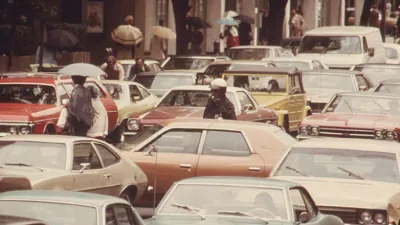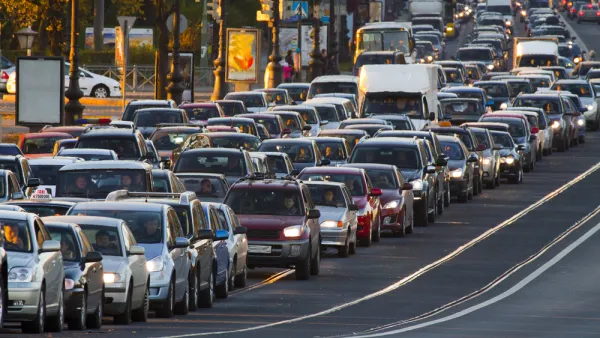The University of Michigan Transportation Research Institute released its eighth report on peak motorization in the U.S., an evaluation of time spent traveling for a broad category of purposes, not just work. From 2004 to 2014, total time decreased.

If you were to take at face value the August 26 Urban Mobility Scorecard prepared by the Texas A&M Transportation Institute (TTI) and INRIX, you'd believe that congestion is worsening throughout the United States, and a good reason to lay more asphalt. Of course, as Planetizen blogger Todd Litman explains here and here, that's hardly the case.
The supposed congestion plaguing American cities also belies the findings of the "Peak Motorization" report from the University of Michigan Transportation Research Institute (UMTRI) released September 1. This report evaluated how much time we spent traveling.
Researcher Michael Sivak evaluates two years only: 2004, the year he previously determined had the highest vehicle miles traveled per capita [PDF], and 2014, the latest year for which data is available from the American Time Use Survey prepared by the Bureau of Labor Statistics—"a representative nationwide survey of how, where, and with whom Americans spend their time."
The tables report trip times for ten categories of trips—for eating, education, work, etc., far different than the one category evaluated by TTI. From the report:
Activities for which average travel time decreased included eating and drinking (from 0.13 hours to 0.10 hours), purchasing goods and services (from 0.30 hours to 0.27 hours), caring for and helping nonhousehold members (from 0.08 hours to 0.05 hours), work (from 0.28 hours to 0.27 hours), education (from 0.04 hours to 0.03 hours), and leisure and sports (from 0.23 hours to 0.21 hours). (These values are for men and women combined.)
"The main implications of the present results are that the total travel time per person decreased substantially from 2004 to 2014," Sivak concludes. However, he adds, "that this decrease is due to a decrease in the proportion of persons engaged in the trips, and not an overall reduction of the duration of the trips."
Click here for a complete list of publications from UMTRI's Sustainable Worldwide Transportation.
FULL STORY: "Has motorization in the U.S. peaked? Part 8: Travel times in 2004 and 2014" [PDF]

Analysis: Cybertruck Fatality Rate Far Exceeds That of Ford Pinto
The Tesla Cybertruck was recalled seven times last year.

National Parks Layoffs Will Cause Communities to Lose Billions
Thousands of essential park workers were laid off this week, just before the busy spring break season.

Retro-silient?: America’s First “Eco-burb,” The Woodlands Turns 50
A master-planned community north of Houston offers lessons on green infrastructure and resilient design, but falls short of its founder’s lofty affordability and walkability goals.

Test News Post 1
This is a summary

Analysis: Cybertruck Fatality Rate Far Exceeds That of Ford Pinto
The Tesla Cybertruck was recalled seven times last year.

Test News Headline 46
Test for the image on the front page.
Urban Design for Planners 1: Software Tools
This six-course series explores essential urban design concepts using open source software and equips planners with the tools they need to participate fully in the urban design process.
Planning for Universal Design
Learn the tools for implementing Universal Design in planning regulations.
EMC Planning Group, Inc.
Planetizen
Planetizen
Mpact (formerly Rail~Volution)
Great Falls Development Authority, Inc.
HUDs Office of Policy Development and Research
NYU Wagner Graduate School of Public Service


























